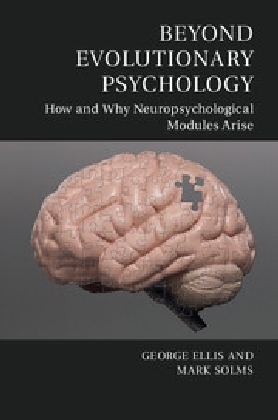
Beyond Evolutionary Psychology
Cambridge University Press (Verlag)
978-1-107-66141-7 (ISBN)
The nature/nurture question is an age-old problem. Beyond Evolutionary Psychology deals with the relation between culture, evolution, psychology and emotion, based both in the underlying biology, determined by our evolutionary heritage, and in the interaction of our brain with the physical, ecological and social environment, based in the key property of brain plasticity. Ellis and Solms show how the brain structures that underlie cognition and behaviour relate to each other through developmental processes guided by primary emotional systems. This makes very clear which brain modules are innate or 'hard-wired', and which are 'soft-wired' or determined through environmental interactions. The key finding is that there can be no innate cognitive modules in the neocortex, as this is not possible on both developmental and genetic grounds; in particular there can be no innate language acquisition device. This is essential reading for students and scholars of evolutionary psychology and evolutionary biology.
George Ellis is Emeritus Professor in the Mathematics Department at the University of Cape Town, and visiting Professor in the Physics Department, University of Oxford. He co-authored, with Stephen Hawking, The Large Scale Structure of Space-Time (Cambridge, 1975). He has been awarded the Star of South Africa Medal by President Nelson Mandela, the Order of Mapungubwe by President Thabo Mbeki, and the Templeton Prize. He has many awards including six honorary doctorates, the latest being awarded by the University of Paris. His latest book is How Can Physics Underlie the Mind? Top-Down Causation in the Human Context (2016). Mark Solms is a psychoanalyst and a Professor in Neuropsychology. He currently holds the Chair of Neuropsychology at the University of Cape Town and Groote Schuur Hospital, and is the President of the South African Psychoanalytical Association. He is also currently Research Chair of the International Psychoanalytical Association and Science Director of the American Psychoanalytic Association. Solms founded the International Neuropsychoanalysis Society in 2000 and was a Founding Editor of the journal Neuropsychoanalysis. He has published over 350 articles and chapters, and seven books, the latest being The Brain and the Inner World (2002, translated into thirteen languages) and The Feeling Brain (2015, his selected papers). He is the lead educator of the free online course 'What is a Mind?' on the platform FutureLearn.
Preface; Acknowledgements; 1. Introduction; 2. The mind and the brain; 3. Hierarchy, modularity and development; 4. Claims of innate modularity; 5. The mind and emotions; 6. A realistic view of evolution, development and emotions; 7. Conclusion; Appendix. Language infinities; References; Index.
| Erscheinungsdatum | 10.01.2018 |
|---|---|
| Reihe/Serie | Culture and Psychology |
| Zusatzinfo | 11 Plates, color; 2 Halftones, black and white; 26 Line drawings, black and white |
| Verlagsort | Cambridge |
| Sprache | englisch |
| Maße | 152 x 228 mm |
| Gewicht | 390 g |
| Themenwelt | Geisteswissenschaften ► Psychologie ► Biopsychologie / Neurowissenschaften |
| ISBN-10 | 1-107-66141-2 / 1107661412 |
| ISBN-13 | 978-1-107-66141-7 / 9781107661417 |
| Zustand | Neuware |
| Haben Sie eine Frage zum Produkt? |
aus dem Bereich


